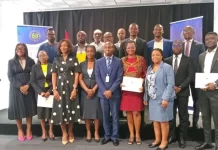
Microsoft has expanded its partnership with the African Development Bank to support Africa’s youth entrepreneurs under the Bank’s Youth Entrepreneurship Investment Banks (YEIB) Initiative.
Through its African Transformation Office (ATO), Microsoft will work with the Bank to develop youth entrepreneurship ecosystems – creating jobs and dramatically scaling impact in Africa through digital inclusion.
Africa’s young population is expected to double in size by 2050, reaching 830 million. Though 10 to 12 million youth join the continent’s workforce every year, just over 3 million jobs are created; meaning large numbers of people remain unemployed.
Youth entrepreneurship will go a long way to solving the employment challenge, but lack of investment, affordable access to finance and quality business development services still present significant hurdles.
“We believe much can be done to help foster youth entrepreneurship by collaborating with the African Development Bank, driving greater economic inclusion for this key segment of the population and ultimately building a more prosperous society,” says the General Manager of Microsoft Africa Regional Cluster Wael Elkabbany. He adds: “Already, we’ve seen considerable success partnering together on initiatives such as Coding for Employment, which aims to equip millions of African youths with employable skills… ultimately creating broadscale employment.”
The African Development Bank Vice President for Private Sector, Infrastructure and Industrialisation, Solomon Quaynor says: “The strengthening of our partnership with Microsoft on the Youth Entrepreneurship Investment Banks (YEIB) is an important development in our journey toward harnessing Africa’s demographic dividend and facilitating the creation of millions of jobs for young Africans by 2025. The initiative places much-needed focus on youth entrepreneurship, which is key to achieving our ambitious employment targets”.
The partnership seeks to support the establishment of national-level institutions through a public-private collaboration model to scale-up technical and financial support for youth entrepreneurs and build their capacity. The Youth Entrepreneurship Investment Bank is a unique value proposition set up by the African Development Bank that anchors and integrates efforts to develop entrepreneurship ecosystems in Africa. Through this initiative, the Bank will bring together all relevant financial and non-financial parties and partners to play their respective roles in supporting youth entrepreneurs through mentorship, coaching, knowledge and experience sharing, and more.
Collaborating with both the private sector and partners, the Youth Entrepreneurship Investment Bank will establish a funding scheme, credit guarantee scheme, and technical assistance programmes to strengthen providers of services to entrepreneurs. In terms of policy support, it will advocate to governments for the business-enabling environment reforms needed to catalyse youth entrepreneurship.
Microsoft will also leverage its partner ecosystem, which covers 54 countries across the continent, to action on key technology solutions across four key areas: these include skilling, connectivity, small-to-medium enterprise (SME) digitisation and hardware:
Skilling
To connect youth to economic opportunity and employability skills, the partnership will provide them with career pathway and learning content. This includes the use of existing e-learning platforms such as Coding for Employment. The initiative also aims to build the capacity of Enterprise Services Organisations, benefitting youth through the training of trainers.
Connectivity
By leveraging successful connectivity solutions such as Microsoft Airband, the partnership will develop effective infrastructure models to help bridge the digital divide. At the same time, it will support other innovative solutions on the market through either direct or indirect investment.
Small and Medium Enterprise (SME) digitisation
The partnership also aims to improve SME digital literacy and business skills by creating access to curated learning content, certifications, business solutions, business skills and specialised digital skills. This will be driven in partnership with LinkedIn and through skilling programmes such as MS Learn and the Cloud Academy. Access to finance for digitally-enabled SMEs will also be facilitated through Microsoft partnerships.
Hardware
SME access to bundled hardware solutions will be created by Microsoft and its partners. SMEs will also be able to purchase Microsoft technology at discounted prices.
The partnership also forms an important part of Microsoft ATO’s mission to empower 10 million SMEs through access to skilling initiatives and investments, and to generate the capacity needed to scale and provide digital skills to 30 million Africans. “We’re excited about the potential of this collaboration to magnify the work Microsoft is doing around digital inclusion in Africa. The digital economy plays an important part in giving rise to innovative new ventures that will create sustainable employment for young Africans. The more we can ensure budding young entrepreneurs are given every opportunity to participate in the digital economy, the closer we get to building a more prosperous future for everyone,” said Angela Kyerematen-Jimoh, Strategic Partnerships Lead-Microsoft ATO.
thebftonline

























